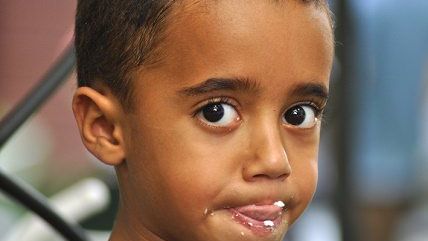Proposed Law Would Label Parents of Fat Kids "Child Abusers"
One extra helping of mofongo and Puerto Rican parents are fonged.


Come out with your hams up!
The Puerto Rican government is proposing a new law that would label the parents of obese kids as "child abusers."
Now, no one is saying that obesity isn't a problem, especially among kids. Obesity rates have doubled worldwide since 1980. The World Health Organization's most recent numbers show 39 percent of the adult population is overweight, and 13 percent is obese. In Puerto Rico, that combined number is 66 percent. As for Puerto Rico's kids: Studies have found their obesity rates to be anywhere from 24 to 30 percent.
So along comes this proposed law: Fat kid = abusive parent. Senator Gilbert Rodriguez Valle introduced the bill that would establish a process of identifying obese children in school ("There's a porker!") and sending social workers to investigate the families. If the social workers see no improvements after a year, the parents could be fined up to $800.
That's right: The government is telling parents they don't know how to feed their own kids. As if shaming and fining is the government's job.
This law ignores the fact that while moms and dads play a big role in their kid's eating habits, so do a plateful of other factors, including education, friends, social norms, the food that's available, and, of course, genes. There's a cornucopia of forces at work in this complex problem, and no simple solution exists—especially not one handed down by an overreaching government.
Dr. Ricardo Fontanet, the president of Puerto Rico's chapter of the American Academy of Pediatrics, highlighted this oversimplified take on obesity, telling The Guardian: "They're not involving pediatricians, nutritionists, dieticians, the people who prepare the lunches in schools, in any of this." Because it's so much simpler to just blame the parents.
The futility of trying to legislate away obesity is well documented. Denmark was one of the first countries to take a stab at this when it enacted a tax on foods containing more than 2.3 percent saturated fat in 2011. Authorities eventually realized that all the law did was inflate food prices, rather than deflating waistlines. They abolished the tax after just a year and cancelled their next plan: a tax on sugary foods.
But Puerto Rico's proposed law is much more sinister. Not only does it misdiagnose the root of the epidemic, it tells parents that the government is sitting at their kitchen table, watching every forkful. One extra helping of mofongo and parents are fonged.
If that doesn't make you want to go scarf a pint of ice cream, what does?


Show Comments (52)